class: center, middle, inverse, title-slide # Week 09: State-Sponsored Violence ## Preventing genocides <html> <div style="float:left"> </div> <hr color='#EB811B' size=1px width=800px> </html> ### Danilo Freire ### 05 November 2019 --- <style> .remark-slide-number { position: inherit; } .remark-slide-number .progress-bar-container { position: absolute; bottom: 0; height: 6px; display: block; left: 0; right: 0; } .remark-slide-number .progress-bar { height: 100%; background-color: #EB811B; } .orange { color: #EB811B; } </style> # Last week we saw that .font140[ * A great number of genocides occur during or after civil/international wars * Barbara Harff suggests that there are a few preconditions of genocide: - Political upheavals, prior genocides, exclusionary ideologies, ethnic/religious cleavages, low economic development * Countries with any of these variables have higher risk of genocides * Political and economic interdependence can mitigate genocide risk ] --- # Last week we saw that .font130[ * Gary Uzonyi argues that not only actual threats, but _perceived_ threats to elites can cause genocide * Politicides and genocides might have different logics: - While genocides are motivated by the goal of exterminating a particular group - Politicides tend to be more affected by domestic unrest, as they are used to maintain a government's stability * Domestic unrest should increase the risk of politicide, but not that of genocide * However, he does not find robust evidence for his hypotheses ] --- # Last week we saw that .font150[ * Valentino and his colleagues argue that killing civilians is a calculated strategy to combat guerrillas * As it is difficult to fight guerrillas directly, states target their base of support * Results show that countries with higher population, guerrillas, and civilian support are more likely to see mass killings * Democracy seems to deter mass killings too ] --- # Last week we saw that .font150[ * Jay Ulfelder affirms that the best way to predict genocide is by combining a large number of models * Genocides and politicides are rare events, thus very difficult to predict * Ensemble models increase predictive accuracy and adds uncertainty to the estimations * Tests model validity by leaving some data out and measuring how well the model performs with unseen data * Early Warning Project and Genocide Watch ] --- class: inverse, center, middle # Preventing genocide <html><div style='float:left'></div><hr color='#EB811B' size=1px width=720px></html> --- # Alex Bellamy (2015) .center[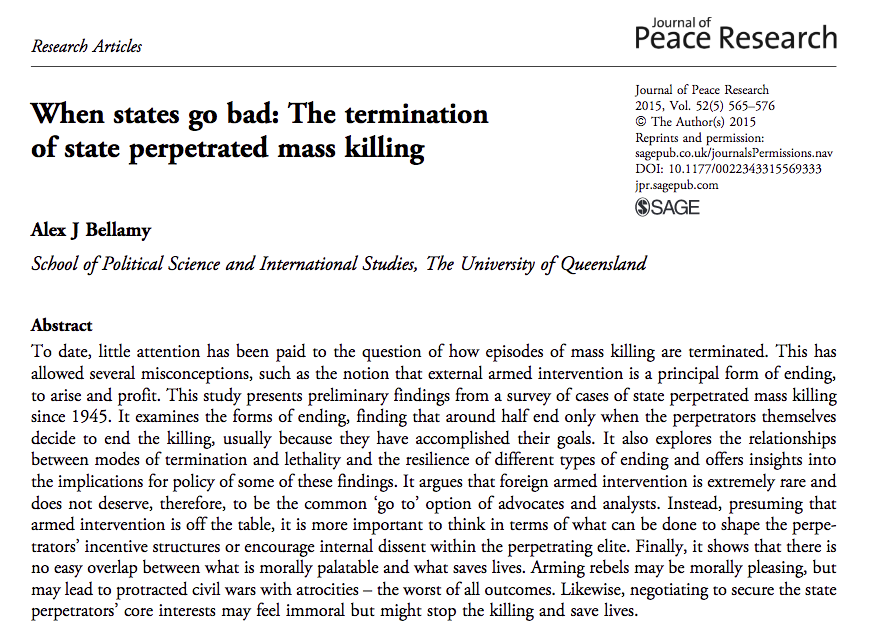] --- # Overview .font140[ * UN's Responsibility to Protect (R2P) implies that the international community should prevent genocides, war crimes, ethnic cleansing, and crimes against humanity * Global compact created in 2005 and it consists of three pillars: - Protection responsibility by the state; international assistance; timely and decisive response * Evoked several times by the UNSC: - Kenya, Libya, Syria, CAR, etc * But is that the best way to end genocides? ] --- # Overview .font140[ * "Best of all worlds" trap: if we can't do what is best, we don't do anything at all * If we look closely at the data, some unexpected patterns emerge * Most cases of genocide de-escalated after the perpetrators achieved their goals * External military interventions account for a small part of the de-escalations ] --- # Mass killings termination .font150[ * We have no good data about how genocides end * The author has some suggestions: - Look at the causes of mass killings, the determinants of civil war duration, and the effect of external interventions - Try an inductive approach and analyse how state-sponsored mass killings have ended in the past ] -- .font150[ * Let's start with the first one ] --- # Causes of mass killings .font150[ * Last week we saw some of the causes of mass killings - Civil wars, guerrillas, political threats to the elites, discrimination against ethnic or religious groups * Although this literature provides some guidance... * ... it might not help us very much here. ] -- .font140[ * **Why?** ] -- .font150[ * Factors that _cause_ mass killing might not be the same that those which account for _mass killing duration_ ] --- # Causes of mass killings .font150[ * Some mass killings do not achieve the perpetrators' purposes * Elites might be divided during the conflict * Not all genocides or politicides happen in times of war ] -- .font150[ * No reason to think that the elimination of causes will end mass killing ] --- # Duration of civil wars .font140[ * Some civil wars last much longer than others * Since early 2000s, researchers have investigated which factors explain civil war duration * As with the literature on civil war onset, there are only a few robust indicators associated with longer wars: - Low GDP per capita - Lootable resources - External support for rebels ] -- .font140[ * But these factors might play a different role in genocides. **Question**: How would the variables above affect mass killings? ] --- # Role of third parties .font150[ * We've already discussed that peacekeeping operations can reduce the duration of civil wars * The author says it might not be the case with genocides. **Why?** Can you think of two possible mechanisms? ] -- .font150[ * Real or perceived threats to leaders ] -- .font150[ * If the third parties do not show resolve, leaders can be even more motivated to carry on the attacks ] --- # How mass killings end: Findings .font150[ * The author identified 65 cases of genocides between 1945 and 2009 * Perpetrators themselves ended a majority of cases - Either because their goals - Or because they changed their goals * This is changing since the end of the Cold War * Negotiating ends are rare * Some episodes end in regime change by domestic groups (more common) or external interventions ] --- # Mass killing termination ```r library(tidyverse); library(viridis) # Required packages # Load data df <- read_csv("~/Documents/github/pols1824w/slides/week09/genocides.csv") # Data manipulation and plot df %>% mutate_at(vars(type), funs(factor)) %>% mutate(outcome = recode(type, "0" = "Goal achieved", "1" = "Regime change by opposition", "2" = "Regime change by external forces", "3" = "Goal shifted", "4" = "Negotiated")) %>% mutate(decade = floor(year/10) * 10) %>% drop_na(outcome) %>% group_by(outcome, decade) %>% mutate(count = n()) %>% ggplot(aes(fill = outcome, y = count, x = decade)) + geom_bar(position = "fill", stat = "identity") + labs(x = "Decade", y = "Count") + theme(text = element_text(size = 24)) + scale_fill_viridis(discrete = T, name = "Outcome") ``` --- # Mass killing termination <img src="week09_files/figure-html/unnamed-chunk-2-1.png" style="display: block; margin: auto;" /> --- # Mass killing termination ```r df %>% mutate_at(vars(type), funs(factor)) %>% mutate(outcome = recode(type, "0" = "Goal achieved", "1" = "Change by opposition", "2" = "Change by external forces", "3" = "Goal shifted", "4" = "Negotiated")) %>% drop_na(outcome) %>% group_by(outcome, year) %>% summarise(n = n()) %>% ungroup() %>% ggplot(aes(x = year, y = n)) + geom_point(aes(colour = outcome), size = 6) + geom_smooth(aes(colour = outcome), se = F, method = "lm") + facet_wrap(.~ outcome) + scale_y_continuous(breaks = c(0, 1, 2, 3)) + theme(legend.position = "none") + theme(text = element_text(size = 32)) + labs(x = "Year", y = "Count") + scale_color_manual(values = c(viridis::viridis(6))) ``` --- # Mass killing termination <img src="week09_files/figure-html/unnamed-chunk-4-1.png" style="display: block; margin: auto;" /> --- # Implications .font150[ * Regime change is becoming more prevalent as a means to end genocides * Domestic actors are more successful than international interventions in changing repressive regimes * But both mitigate atrocities * **Question**: if you were a policy-maker, what would you do to stop mass killings? What are the pros and cons of each strategy? ] --- # Matthew Krain (2005) .center[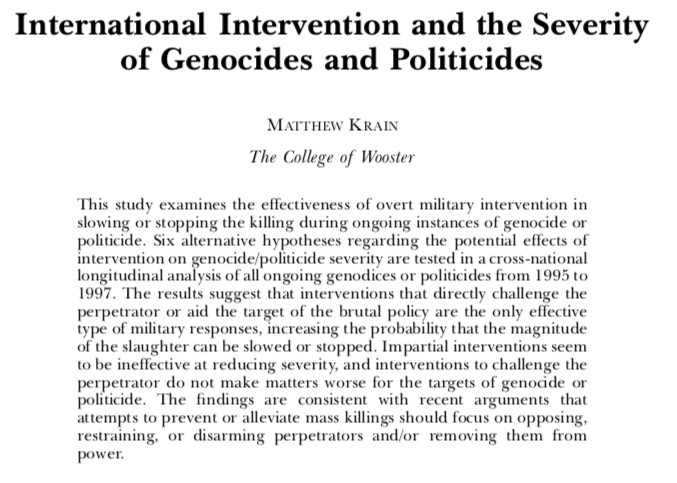] --- # Matthew Krain (2005) .font150[ * As we've seen before, the UN has increasingly discussed the used of international interventions * The international community frustrated expectations in Bosnia, Timor Leste, Darfur, etc * Recent failures have raised questions about the effectiveness of interventions in foreign countries * We have already discussed the role of peacekeeping operations (PKOs) in civil wars, but how do they affect the incidence of mass killings? ] --- # PKOs, civil wars, and genocides .font150[ * Most research has focused on the interaction between PKOs and civil war duration * However, genocides pose a much harder problem for the UN * "In a matter of 100 days, almost 800,000 people were slaughtered in Rwanda, a rate of approximately 8,000 per day" * Genocide duration is not correlated with genocide severity ] --- # PKOs, civil wars, and genocides .font150[ * A major question is that PKOs can have heterogeneous effects on mass killings * While it can force perpetrators to stop the violence... * It can also increase the pressure over them and accelerate the rate of murders * Also, even PKOs can't stop the killings, they might reduce the levels of violence ] --- # PKOs, civil wars, and genocides .font150[ * While in civil wars PKOs can choose a side to collaborate with, in genocides there is only _one_ group making the decisions * This makes the situation harder as the target population by definition can't help * Thus, the author says, _the motivations of the intervention don't matter_, as PKO's only chance of success lies in stopping the perpetrator by any means * **Question**: do you agree? ] --- # Intervention models .font150[ * Three strategies don't seem to work: * Do nothing * Neutral interventions * Aiding the perpetrator * What seems to work: directly challenge the perpetrator * **Why?** ] --- # Other factors .font150[ * Duration: the longer the genocide, the more the leaders learn how to kill more efficiently * Previous conflicts: leaders know that they can continue genocidal policies, or past grievances can increase the likelihood of future mass killings * Contiguity: contiguous states can either increase or decrease the severity of violence ] --- # Other factors .font150[ * Regime type: democracies are more peaceful than dictatorships * Ethnic fractionalisation * Economic marginalisation: increase the severity of mass killings. How do they affect *the perpetrator*? ] --- # Results .center[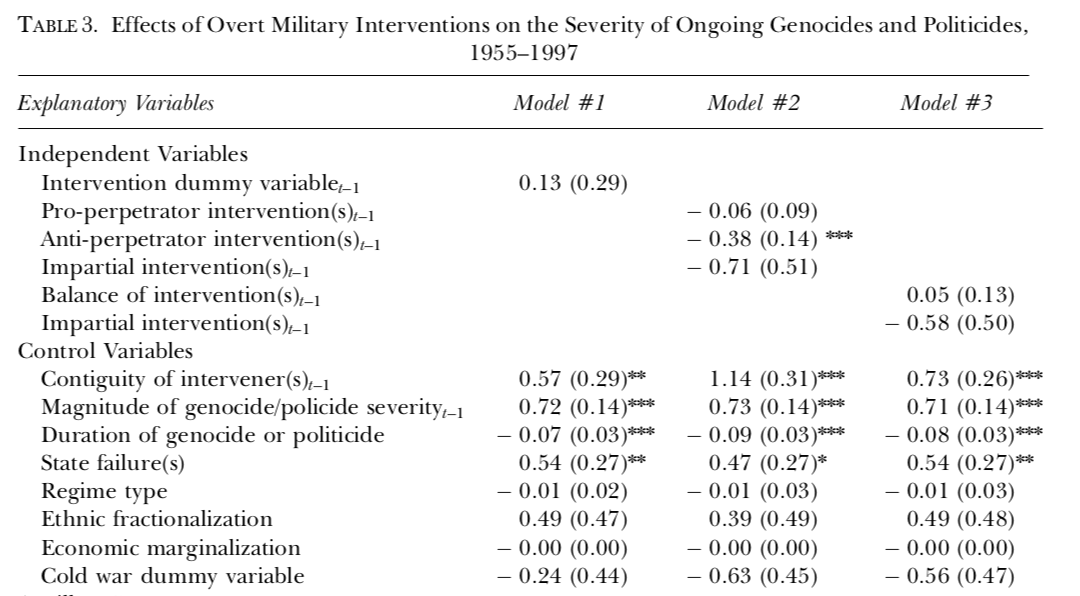] --- # Results .font140[ * The findings suggest that: * International interventions that do not support the perpetrator (either against the perpetrator or as an impartial force) do not have an effect on the severity of genocide or politicide * Impartial interventions have no statistically significant effect on the severity of state-sponsored mass murder * Additional support for perpetrators does not make an already lethal policy more lethal * The balance of interventions has no statistically significant effect on severity ] --- # Results and implications .font150[ * The only overt military interventions that appear to be effective in reducing the severity of genocides or politicides are those that explicitly challenge the perpetrator of the atrocities * Implications: - The UN should use even more military force to stop governments from perpetrating genocide - The UN should explicitly _take sides_ in the conflict * What do you think? ] --- # Eric Melander .center[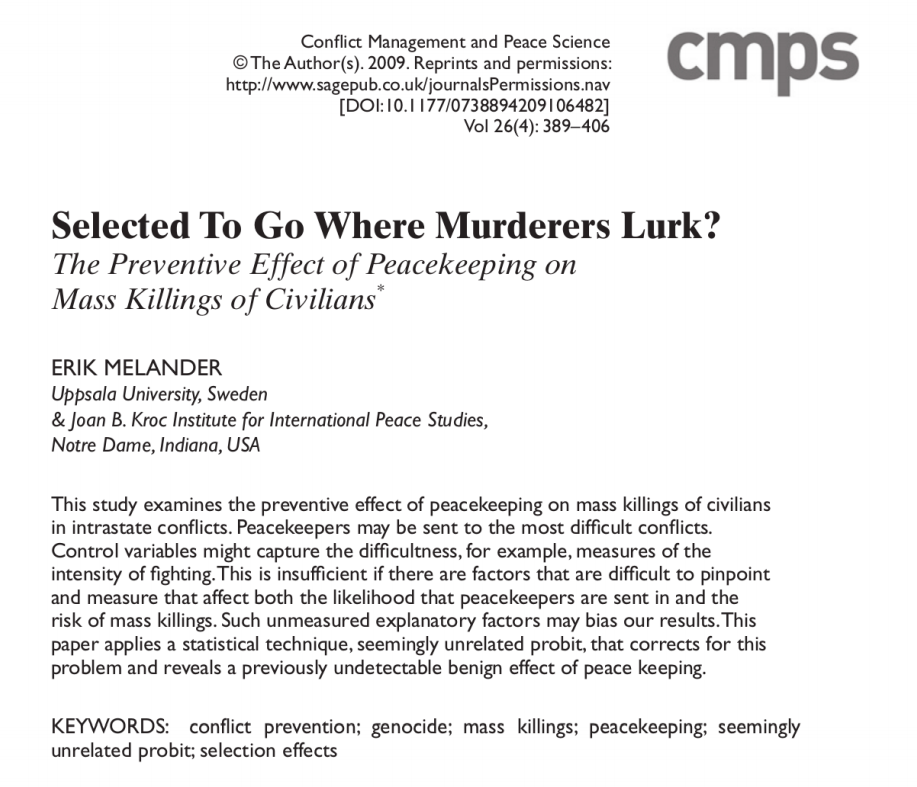] --- # Introduction .font150[ * Civil wars have declined since their peak in 1992 * "New new civil wars" are not as violent as previous conflicts * Scepticism about the potential of IOs to reduce or eliminate genocides * Selection bias: PKOs are deployed to the worst conflicts * Account for the difference in "seriousness" of conflicts * Proposed solution: estimate seriousness of conflicts and PKO deployment at the same time ] --- # PKOs and mass murder .font150[ * Cites Fortna's work on PKOs deployment * Since PKOs are costly, organisations will only use them in extreme situations * Previous history of mass killings is the most important outcome to predict future PKO deployment * However, some third factor can influence both variables simultaneously - Question: which ones? ] --- # PKOs and mass murder .font150[ * Evidence shows that PKOs that confront the perpetrators are more likely to succeed * Capability to prevent mass killings is not the same as the capability to stop ongoing massacres * **Question**: what does that imply in terms of policy recommendations? ] --- # Causes of both mass murder and PKOs .font150[ * Previous major upheavals * Level of democracy * Additional controls: - Intensity of fighting; Cold War; population size; regional fixed effects ] --- # Causes of both mass murder and PKOs .center[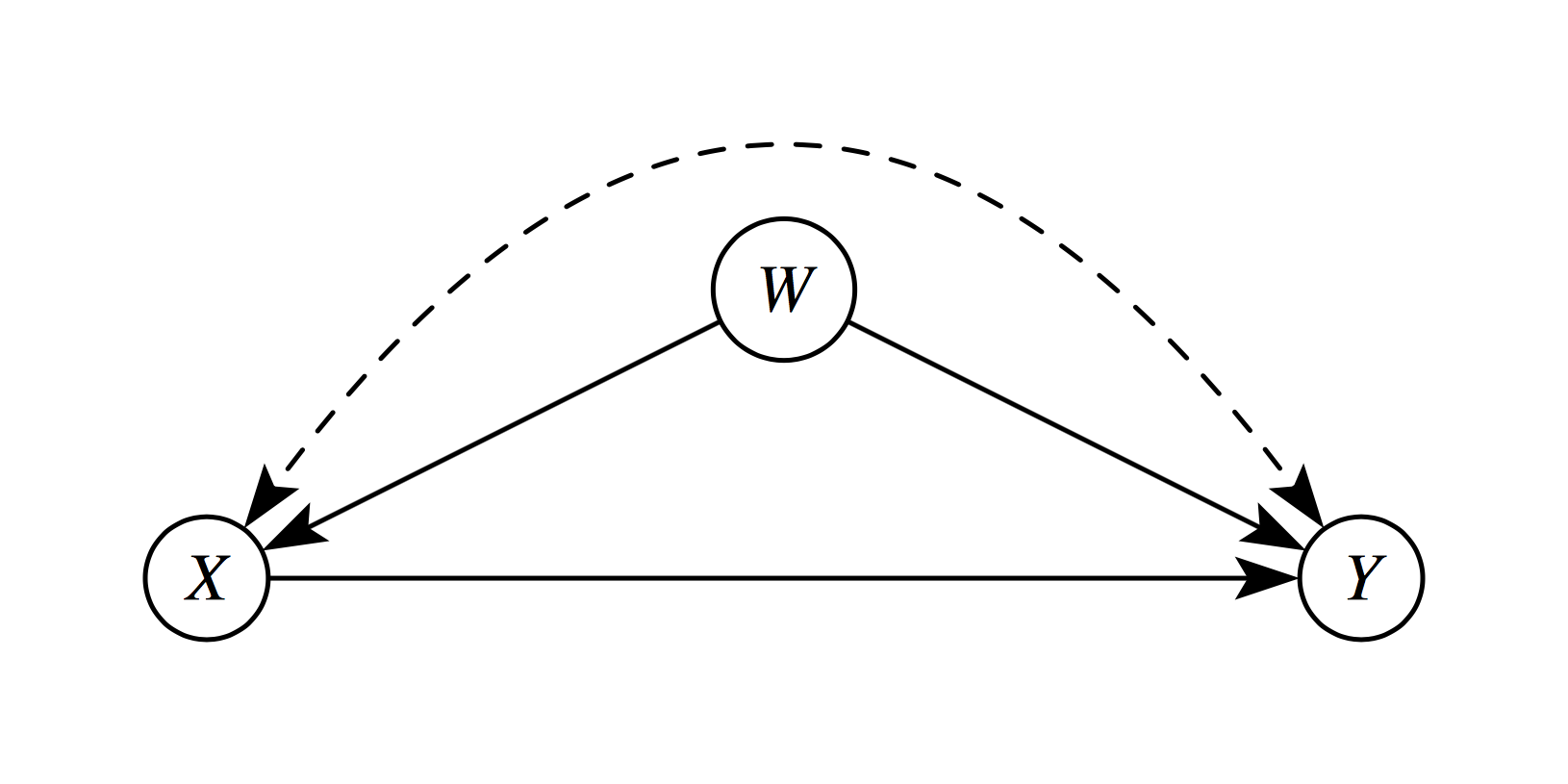] --- # Results .center[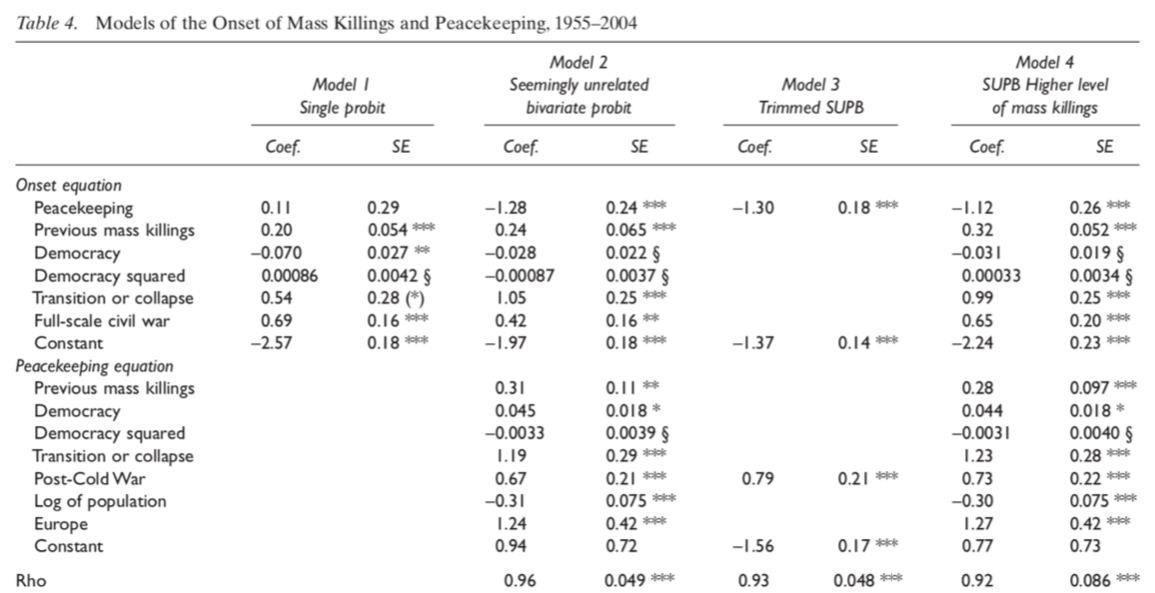] --- # Results .font140[ * Jointly significant (Rho) ] --- # Results .font150[ * No association between PKO and onset of mass killings * Previous episodes of mass killings increase the likelihood of future ones * "Anocracies" have higher risk of mass killings * State failure correlated with genocides, too * _PKOs are negatively associated with onset of genocides in the main models_ ] --- # Conclusions .font150[ * PKOs are deployed to the worst cases of human rights abuses * Hidden factors account for both the worst mass killings and the deployment of PKOs * PKOs might be effective to prevent future genocides ] --- # Matthew Krain (2016) .center[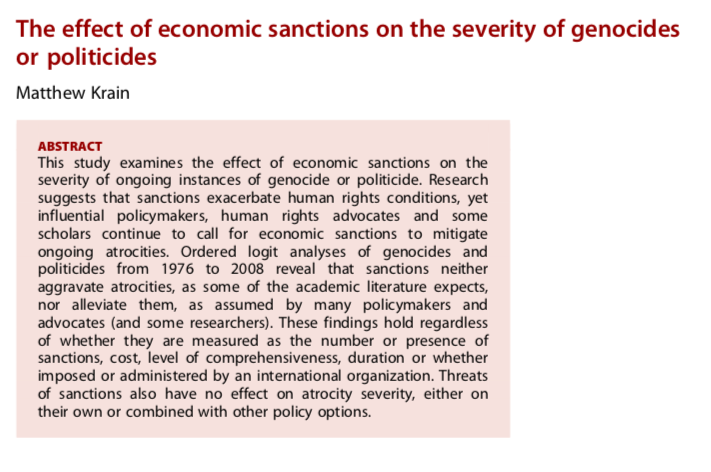] --- # Economic sanctions and genocide .font150[ * Genocide prevention is usually addressed by deployment of PKOs or international condemnation in the press * Middle-ground alternative: _economic sanctions_ * Some evidence that they reduce the duration of civil wars * But little evidence on their impact on mass killings ] --- # Mechanisms .font150[ * In favour of economic sanctions: * Economic sanctions might change perpetrator perceptions of the costs of continuing the slaughter * Like naming and shaming, such action labels perpetrators as norm violators, which in turn will lead to costs imposed by others in the international community * Framing perpetrators as international pariahs makes it harder for others to support or do business with them without being similarly labelled ] --- # Mechanisms .font150[ * Why economic sanctions can be ineffective: * Often cheap talk: monitoring problems * Dependent on regime type: closed regimes with more centralised control are better able to resist sanctions * Principals may be unable to control the agents actually doing the killing sufficiently to slow or stop ongoing atrocities * Significant increase in the use of repression and political terror ] --- # Mechanisms .font150[ * Why economic sanctions can _sometimes_ be effective: * "Smart sanctions" - Travel bans, bank account suspensions, frozen government assets * Efforts by international organisations have more legitimacy * Threats might be more effective than sanctions themselves (?) ] --- # Results .center[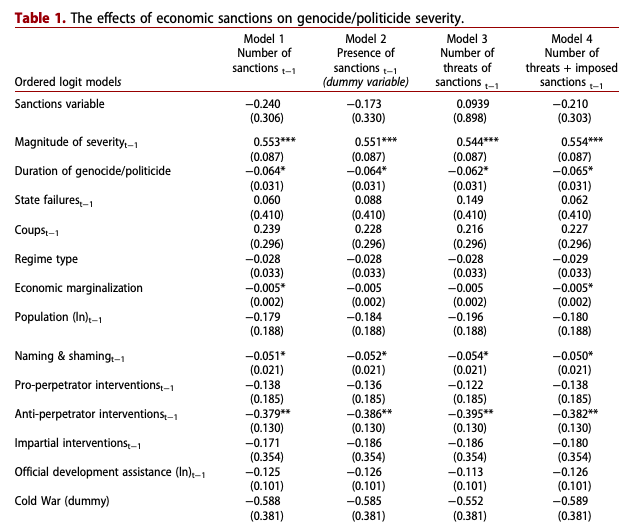] --- # Results .font150[ * _Economic sanctions do not work_ * **Question**: why is it important to publish negative results? ] -- .font150[ * _File drawer problem_ ] --- # Publication bias .center[] --- # Publication bias .center[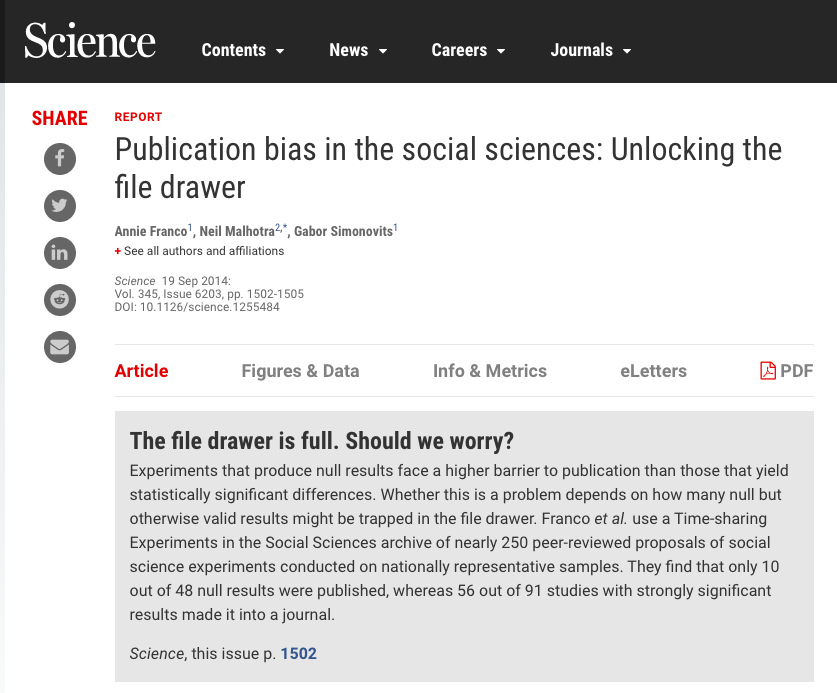] --- # Publication bias .center[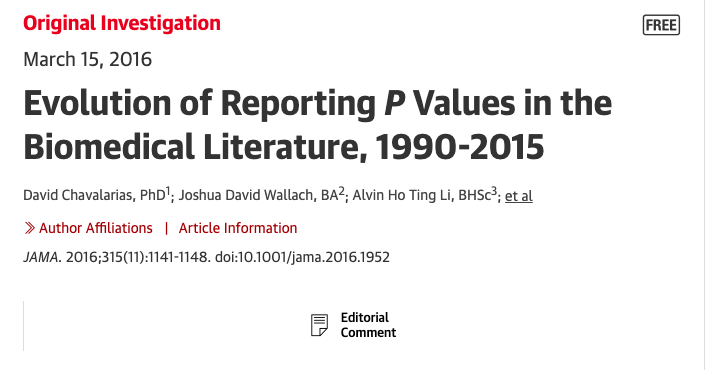] --- # Publication bias .center[] --- # Publication bias .center[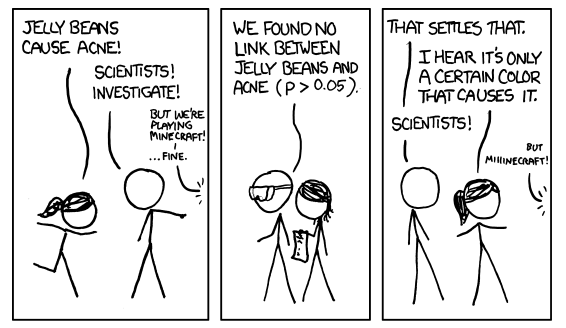] --- # Publication bias .center[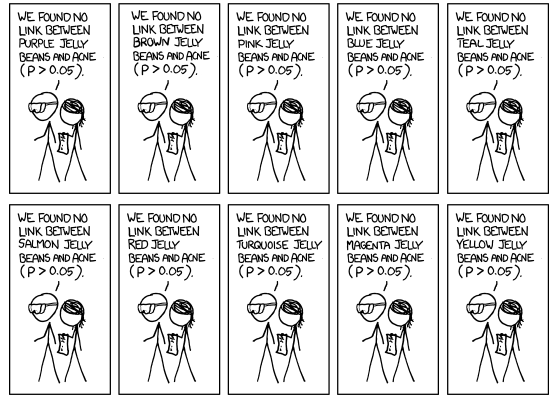] --- # Publication bias .center[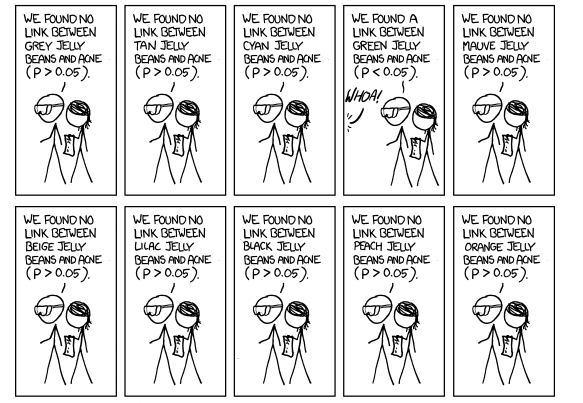] --- # Publication bias .center[] --- # Publication bias .center[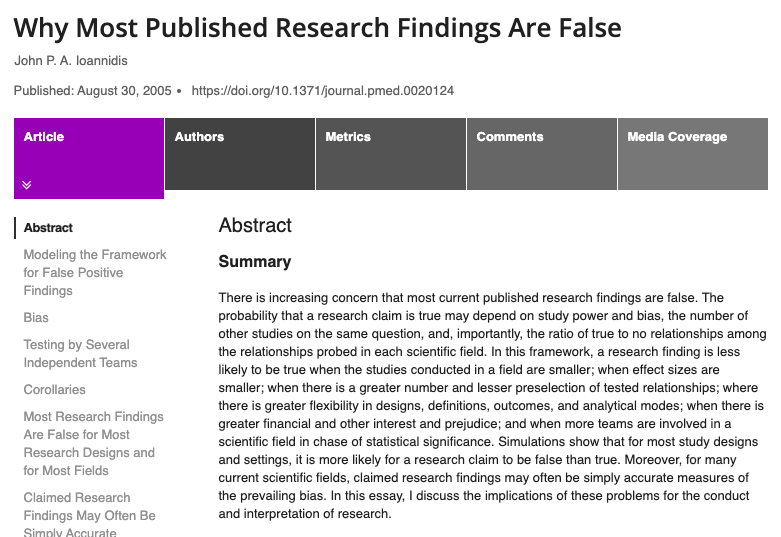] --- # Conclusions .font150[ * Until the end of the Cold War, the vast majority of mass killings ended after perpetrator victory * External forces and domestic opposition are increasingly able to stop genocides * PKOs seem to prevent mass killings * But only when they are targeted against the perpetrators * Economic sanctions have no effect ] --- --- class: inverse, center, middle # See you next week! <html><div style='float:left'></div><hr color='#EB811B' size=1px width=720px></html>